
The European Bamboo Expo is pleased to announce that Pascal Franck, Scientific Assistant at the Laboratory of Timber Engineering, RheinMain University of Applied Sciences, Wiesbaden, will deliver a presentation titled “Mechanical Comparison of Bamboo in Relation to Wood and Teaching Approaches to Promote the Understanding of Bamboo Construction.”
This presentation will delve into the mechanical properties of bamboo compared to wood and explore innovative teaching strategies to enhance the understanding of bamboo construction principles.
The RheinMain University of Applied Sciences has been an invaluable partner of the European Bamboo Expo since its inception in 2023. Their contributions to bamboo research and education set a benchmark for sustainable development in Germany and exemplify the integration of academic excellence into practical applications.
Abstract
P. Franck1,*; O. Bletz-Mühldorfer1; L. Bathon1; S. Luippold2; R. Scholz3; F. Walther3
- RheinMain University of Applied Sciences, Department of Architecture and Civil Engineering, Laboratory of Timber Engineering, Kurt-Schumacher-Ring 18, 65197 Wiesbaden, Germany
- RheinMain University of Applied Sciences, Department of Architecture and Civil Engineering, Chair of Design and Climate-friendly Construction, Kurt-Schumacher-Ring 18, 65197 Wiesbaden, Germany
- TU Dortmund University, Chair of Materials Test Engineering (WPT), Baroper Str. 303, 44227 Dortmund, Germany
*Corresponding author: M.Sc. Pascal Franck, pascal.franck@hs-rm.de
The global demand for sustainable and eco-friendly solutions in technical fields has grown steadily in recent years. A shifting focus on wooden buildings as an alternative to common buildings made of energy-intensive materials such as concrete can already be observed to some extent in the European building industry. Because of climate change and more frequent pest infestations domestic forests are facing major challenges and, in some cases, have already been drastically reduced. Newly planted trees have long growing times of 60-80 years and thus the sustainable and fast-growing material bamboo can be a promising alternative with approx.10 times faster growing time of 5-8 years. Beyond that, the material has a significantly higher potential for sequestering CO2 than wood. The material’s mechanical properties are always further researched, showing characteristic values comparable or superior to common wood species.
The overarching objective is to familiarize the general populace in Europe with the aforementioned foreign material. The initial approach entailed conducting material tests on bamboo to ascertain its material properties and subsequently compare them with those of wood. In particular, the flexural properties of bamboo culms and further processed engineered bamboo (“Laminated bamboo lumber”, LBL) were investigated in bending tests. Afterwards, the promising results were compared to equal tests on solid wood beams. As a second approach, there has been a years-long class series thematizing the process of climate-friendly building with bamboo at the RheinMain University of Applied Sciences. The interdisciplinary and international courses are designed to raise awareness of bamboo among future Architects and Civil Engineers. To achieve this, various courses may be pursued to accompany the process from design to realization of the bamboo building.


